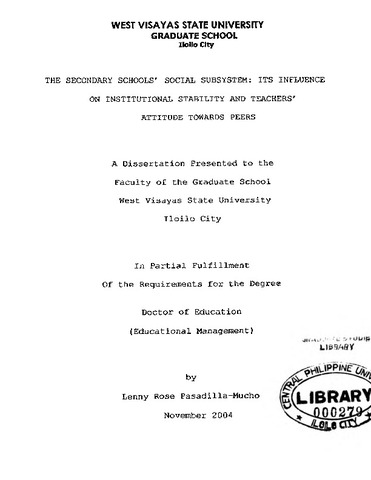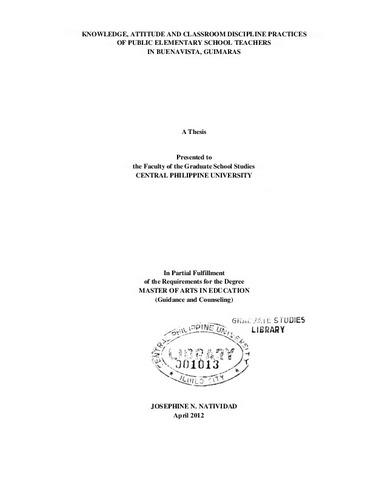Показать сокращенную информацию
The secondary schools' social subsystem: Its influence on institutional stability and teachers' attitude towards peers
| dc.contributor.adviser | Ticao, Eda C. | |
| dc.contributor.author | Mucho, Lenny Rose | |
| dc.date.accessioned | 2021-04-07T05:08:23Z | |
| dc.date.available | 2021-04-07T05:08:23Z | |
| dc.date.issued | 2004-11 | |
| dc.identifier.citation | Mucho, L. R. P. (2004). The secondary schools' social subsystem: Its influence on institutional stability and teachers' attitude towards peers (Unpublished Doctoral dissertation). West Visayas State University, Iloilo City. | en_US |
| dc.identifier.uri | https://hdl.handle.net/20.500.12852/725 | |
| dc.description | Abstract only | en_US |
| dc.description.abstract | This descriptive-correlational study aimed at ascertaining the social subsystem— personnel's social integration skills, organizational structure, organizational climate, and organizational management of public secondary schools in Iloilo City and its influence on institutional stability and the teachers' attitude towards peers. Data were obtained from the 240 randomly selected teachers of seven public high schools in Iloilo City using three researcher-made data gathering instruments. Statistical tools employed were: frequency counts, percentage analysis, means, standard deviations, the One-Way Analysis of Variance, and the Pearson's r. Alpha level for all inferential tests was set at .05. Results revealed that the teachers' perception of personnel's social integration skills profile was "strong," organizational structure profile "structured, organizational climate profile "warm," organizational management profile "effective." The teachers generally perceived institutional stability as "stable and they had a "positive" attitude towards their peers when taken as an entire group. They differed significantly in their perception of institutional stability when grouped according to their perception of personnel's social integration skills, organizational structure, organizational climate and organizational management and in their attitude towards their peers when grouped according to their perception of personnel's social integration skills. Positive and significant relationships were found between the teachers' perception of institutional stability and their attitude towards their peers. | en_US |
| dc.format.extent | xii, 232 leaves | en_US |
| dc.language.iso | en | en_US |
| dc.rights | Attribution-NonCommercial-NoDerivs 3.0 Philippines | * |
| dc.rights.uri | http://creativecommons.org/licenses/by-nc-nd/3.0/ph/ | * |
| dc.subject.ddc | GSL Theses 378.242 M881 | en_US |
| dc.subject.lcsh | Teachers--Attitudes | en_US |
| dc.subject.lcsh | High schools | en_US |
| dc.subject.lcsh | Public schools | en_US |
| dc.subject.lcsh | Organizational behavior | en_US |
| dc.subject.lcsh | High schools--Administration | en_US |
| dc.subject.lcsh | Teachers--Social conditions | en_US |
| dc.subject.lcsh | High school teachers--Social conditions | en_US |
| dc.title | The secondary schools' social subsystem: Its influence on institutional stability and teachers' attitude towards peers | en_US |
| dc.type | Dissertation | en_US |
| dc.description.bibliographicalreferences | Includes bibliographical references | en_US |
| dc.contributor.committeemember | Abioda, Luis A. | |
| dc.contributor.committeemember | Andora, Henry J. | |
| dc.contributor.committeemember | Loyola, Ma. Luis L. | |
| dc.contributor.department | College of Education | en_US |
| dc.description.degree | Doctor of Education major in Educational Management | en_US |
Файлы в этом документе
Данный элемент включен в следующие коллекции
-
Dissertations [2]






